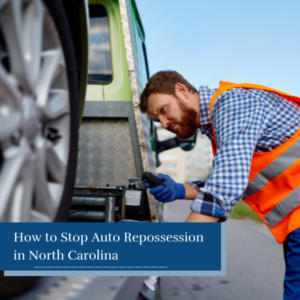How to Stop Your Car from Being Repossessed

If you took a loan to buy a vehicle and cannot make your monthly payments, your vehicle could be repossessed by the lender. If you have been delinquent in making your monthly payments for a period of 45-75 days, you should concerned about repossession. There are several possible ways to keep your vehicle from being reposessed.
Don’t hesitate to contact the bankruptcy attorneys at Sasser Law Firm today to discuss how to prevent your car from being repossessed or to recover a vehicle that has been repossessed.
Options to Stop Your Car From Being Repossessed
Depending on the circumstances of vehicle repossession, there are a few ways you can avoid it, including the following:
- Filing bankruptcy —Filing for bankruptcy offers protection from vehicle repossession and other debt collections. Depending on your specific circumstances, you could file for either Chapter 7 or Chapter 13 bankruptcy. A bankruptcy lawyer can help you understand each option’s impact on your vehicle loan. If the goal is to retain the vehicle, then filing a Chapter 13 is likely the appropriate chapter. A Chapter 7 bankruptcy will provide very limited protection with regard to a vehicle you wish to retain.
- Getting current on your payments — Depending on the terms of your loan, you may not be in default until the creditor alerts you in writing. You could make up for the payments you’ve missed by paying the debt and any late fees.
- Redeeming the car — If your vehicle has already been repossessed, you have a right to redeem it up until the point the vehicle is resold. To do this, you would need to pay everything you still owe on the vehicle loan. Unfortunately, this may not be a realistic option. If you aren’t able to make your monthly payments, you probably can’t clear your outstanding debt.
- Negotiating with the lender — You could also negotiate with the lender to find a way to get rid of or lower your debt without repossession. You could also voluntarily surrender (aka voluntary repossession) the vehicle and attempt to minimize a future deficiency liability. You could also sell the vehicle to pay off the loan.
- Modify the terms of the existing loan or refinance the loan — If your monthly payments are too high, you could seek to negotiate a loan modification with the creditor. Or you could try to find another lender that offers better terms and refinance the loan.
How Does Bankruptcy Stop Repossession?
When you file for bankruptcy in North Carolina, a stay is issued that prevents lenders from collecting debts. Under the stay, a creditor is legally barred from contacting you, suing you, continuing a lawsuit, or repossessing your vehicle. The stay means that the vehicle is protected from repossession for so long as it is in place.
An automatic stay will not force the lender to give the vehicle back to you after it’s already been repossessed. That’s why it is helpful that you file for bankruptcy prior to when the vehicle has been repossessed. However, if the vehicle has been repossessed but not yet resold by the lender, a bankruptcy filing will stop the resale. In most instances, the bankruptcy will result in a quick (1-2 business days) recovery of the vehicle, so long as there is proof of insurance on the vehicle and no extenuating circumstances. However, the debtor will need to travel to the location of the vehicle to pick it up and either have to pay repossession and storage cost directly or as part of the claim in the bankruptcy case.
Talk to our Experienced Bankruptcy Attorneys in North Carolina
If you cannot make your car payments and are concerned about your vehicle being repossessed, or if your vehicle has been repossessed and you want the vehicle back, consider contacting Sasser Law Firm for a free consultation at (919) 319-7400. Our firm does not require upfront fees or cost for filing Chapter 13, as we are paid those through the Chapter 13 trustee disbursements.
- About the Author
- Latest Posts
For more than 20 years, the Sasser Law Firm has been helping individuals and business owners sort through financial hardships to see the light at the end of the tunnel. Our North Carolina bankruptcy attorneys are all board-certified specialists, which means we have passed a complex exam, undergone a thorough peer review, and continue to earn legal education credits in this ever-evolving area of law.














